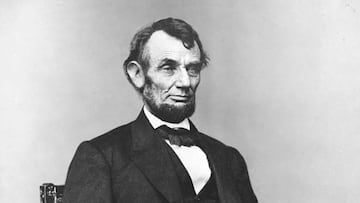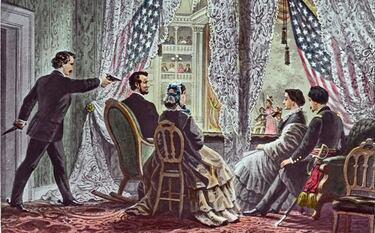Who killed Abraham Lincoln, when, how and why?
The 16th President of the United States, Abraham Lincoln was assassinated by a Confederate sympathizer while attending a night at the theatre with his wife.

The American Civil War had ended just days before with Confederate General Robert E. Lee surrendering his army at Appomattox Court House, Virginia. The jubilation of this event would soon be shattered by the news that President Lincoln had been murdered.
On the evening of April 14, 1865, while enjoying a play at the Ford’s Theatre in Washington, D.C., Abraham Lincon was assassinated by John Wilkes Booth. Lincoln died the following morning but it would be two weeks before his assassin was captured.
Who was John Wilkes Booth?
John Wilkes Booth was born 10 May in 1838 in Maryland to prominent British actors Junius Brutus Booth and Mary Ann Holmes. Following in his parent's footsteps, he too became an actor and, at 17 debuted in Shakespeare’s Richard III in 1855 in Baltimore. The year prior he also became politically active in the Know Nothing Party, a nativist political movement of the time.
Booth become a renowned actor, entertaining audiences with his energetic performances. When the Civil war broke out he let his admiration for the Southern Secession known, almost getting himself banished from Albany, New York.
He spent the Civil War years traveling extensively to perform in the North and South. He used his travels and position to smuggle the anti-malarial drug quinine into the South according to his sister Asia.
Contents of pockets of Abraham Lincoln (born today 1809) at moment of assassination, 1865, Ford’s Theatre—not shown to public for 111 years: pic.twitter.com/awYPjgup4R
— Michael Beschloss (@BeschlossDC) February 12, 2021
The plot to kidnap Abraham Lincoln
When the tide had clearly turned against the South and the end of the war became apparent, he decided to act. Along with his friends Samuel Arnold and Michael O'Laughlen, he hatched a plot to kidnap President Lincoln. Once in their possession, they planned to smuggle Lincoln to Richmond, Virginia, the Confederate capital.
Things did not go as planned though. The day of the planned abduction, 20 March, 1865, Lincoln never appeared at the intended location. Two weeks later Richmond was in the hands of Union forces, and General Robert E. Lee surrendered at Appomattox Court House on 9 April.
The Lincoln assassination
Having failed to kidnap President Lincoln, and the plan no longer viable with Richmond in Union control, Booth moved on to plan B, assassination. By chance he discovered that Lincoln and his wife would be attending a performance of “Our American Cousin” at Ford’s Theatre. With his accomplices, his plan was to kill Lincoln, while his co-conspirators would assasinate Vice President Andrew Johnson and Secretary of State William H. Seward effectively decapitating the government.
The Lincolns attended the play accompanied by a young army officer named Henry Rathbone and his fiancée Clara Harris. The group sat in a private box overlooking the stage. Around a quarter past 10pm, Booth slipped into Lincoln’s box and shot the President in the back of the head with a .41 caliber Deringer pistol.

“Your name is Mudd”
A stunned Rathbone, immediately tried to apprehend the assailant, but Booth stabbed him in the shoulder. Booth then leapt off the balcony to the stage and shouted “Sic semper tyrannis!” (“Thus ever to tyrants!”–the Virginia state motto). The first reaction of the crowd was to think it was all part of the act, until they heard Mary Lincoln’s scream.
There are contrary views on whether he broke his leg jumping to the stage or later during his escape, but Booth managed to get away. He had prepared a horse to spirit him from the city. His two co-conspirators failed in their attempts.
Being a famous actor, Booth was recognized instantly by many in the audience and the Union army was soon in pursuit of him and his accomplice David Harold. The two stopped at the home of Samuel Mudd, a doctor who treated Booth’s broken leg. For his efforts, Dr. Mudd was given life imprisonment, which was later commuted, and the expression ‘your name is Mudd’ was coined after him.
John Wilkes Booth is captured
Union troops finally caught up with the pair on April 26, and surrounded the Virginia barn where Booth and Herold were hiding. Herold surrendered but Booth remained inside saying "I prefer to come out and fight." Hoping to flush the fugitive out, the troops set the barn on fire. As the blaze grew, a sergeant shot Booth in the neck, and he was eventually carried out of the building alive. Booth held on for a few more hours before asking that his hands be raised to his face so that he could see them. Gazing at his hands, he uttered his last words: “Useless, useless.”
Lincoln’s death
After Lincoln was shot, a young doctor in the audience named Charles Leale rushed to the presidential box to treat the President. Several soldiers carried Lincoln to a boardinghouse across the street and placed him on a bed. When the surgeon general arrived at the house, he concluded that Lincoln could not be saved and would probably die during the night.
While the Lincoln lay dying, friends, members of his Cabinet and Vice President Andrew Johnson stood vigil by his bedside. Mary Lincoln, accompanied by her eldest son Robert Lincoln, was distraught with grief in the adjoining room.
Lincoln was pronounced dead at 7:22 am, 15 April, 1865, at the age of 56.
Six-year-old future President Theodore Roosevelt (circled, upper left) watches Abraham Lincoln's funeral cortège in New York City, 1865: pic.twitter.com/3FCtPV7Clf
— Michael Beschloss (@BeschlossDC) February 12, 2021
The nation mourns Lincoln
Related stories
After the President died, he was transported to the White House with an armed cavalry escort. On April 18, Lincoln’s body was carried to the Capitol rotunda where he lay in state for three days. After which, his remains were boarded onto a train that transported him to Springfield, Illinois. Thousands of Americans line the train tracks along the funeral train route.
He was buried along with his son William Lincoln 4 May, 1865 at Oak Ridge Cemetery.


